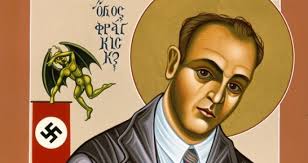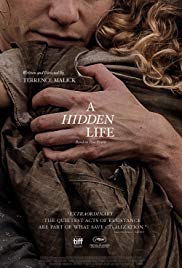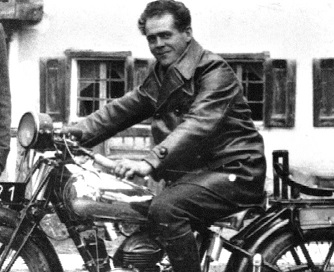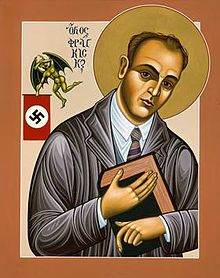A FILM ON A WORLD WAR II SAINT YOU MIGHT LIKE TO SEE: FRANZ JAGERSTATTER, BEATIFIED BY BENEDICT XVI IN 2007

A HIDDEN LIFE
US/Germany, 2019, 174 minutes. August Diehl, Valerie Pachner. Directed by Terrence Malick.
The title comes from a quotation, George Elliot in Middlemarch. It highlights the power of small and hidden lives, their power for good and its effect. The quotation rightly applies to the Austrian conscientious objector to his country’s involvement in World War II, to the oath of loyalty that each soldier was required to make to Adolf Hitler himself.
“..for the growing good of the world is partly dependent on unhistoric acts; and that things are not so ill with you and me as they might have been, is half owing to the number who lived faithfully a hidden life, and rest in unvisited tombs.”
This is the story of Franz Jagerstatter, the Austrian farmer who was prepared to go to prison, prepared to die for his convictions, the conscientious objector against Hitler and the war. While the film shows his Austrian Catholicism, his life of faith and devotion, the advice he seeks from the parish priest as well as from the Bishop, the screenplay does not name his Catholicism so explicitly. And, at the end, there is no indication that, in fact, Franz Jagerstatter was beatified by Pope Benedict XVI in 2007, a strong witness to the injustices of the war. Jagerstatter is the Catholic stance while Dietrich Bonhoeffer, Lutheran pastor, is the Protestant witness to anti-Nazi defiance.
This film, running five minute short of three hours (which some reviewers and audiences have found rather long, languorously long) has been directed by the celebrated Terrence Malick and so has received more extensive release.

While A Hidden Life does tell its story in a continuous linear screenplay, Malick has never been a conventional storyteller. While he has a deep admiration for Jagerstatter and his stances and his faith motivations leading to ultimate self-sacrifice, Malick is something of a visual poet. With Italian mountain locations standing in for Austria and Jagerstatter’s village of St Radegund, so much of the film, with his using widescreen lenses, invites wonder and contemplation. Jagerstatter comes from a beautiful natural world, lives in harmony with it is a farmer, but is prepared to leave it because of principle and conviction.
He is portrayed by German actor, August Diehl, who makes a convincing character. He is matched by Valerie Pachner as Fani, his wife,. We see their courtship, their marriage, having a child, the hard work in those beautifully-shot fields, with the mountain backgrounds. We see their life with other people in the village. We see them at church.
Perhaps this should have been mentioned earlier, but the opening minutes of the film have substantial and disturbing footage from the 1930s, Hitler and his entourage, public rallies, his speeches, the adoring public, the spirit of Heil Hitler. Obviously, this creates an initial atmosphere for this story. So, Franz goes to a neighbouring town for military training, bayonet practice, encountering a friend who is a conscientious objector. When Franz returns home, he is troubled, sharing this with Fani, but their becoming victims of derision by their fellows, being vilified, finding it difficult to sell their produce (though some sympathy from the few older women). Fani’s sister, unmarried, comes to live on the farm and help with the work but strong moral support. Frantz’s mother, hostile to Fani, also lives there.

It is no surprise when Franz is called up, refuses the salute and the oath, is imprisoned, interrogated, mocked, treated badly. Fani tries to organise a visit to him but is baffled by bureaucratic manipulation. However, the screenplay relies on excerpts from their many letters, declarations of conviction, loving support, spoken in voice-over by the couple.
A lot of the second part of the film is spent in prisons, especially with the transfer of Franz to Berlin, the range of prisoners there, the maltreatment, interrogations, torture, squalid cells, time in the yards, the witnessing of executions. There is the pathos of their not being allowed to touch when Fani, accompanied by her father, is eventually allowed to see her husband in Berlin.
And, it is jolting for the prisoners to witness executions, a guillotine, and jolting for audiences to watch the men going to be killed. Martyrdom is demanding.
Terrence Malick, making this film in his 70s, drawing on his expertise in filming even drastic circumstances with beauty, exploring the nobility of the human spirit, has given this 21st-century world a witness to faith and heroism, for which we can be grateful.

Winner of the Ecumenical Award, Cannes, 2019.
Peter Malone MSC